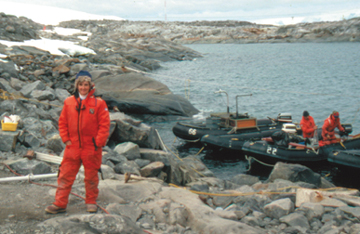 As a pioneer woman
in the geosciences, Ashley has held open many doors for others to follow. At
Rutgers University she has supervised 34 graduate student theses and dissertations
with all but one of her students continuing on as practicing geologists. Her
students are scattered throughout state geological surveys, academia (including
a department head and dean), in consulting companies, in the National Park Service
and in the oil patch.
As a pioneer woman
in the geosciences, Ashley has held open many doors for others to follow. At
Rutgers University she has supervised 34 graduate student theses and dissertations
with all but one of her students continuing on as practicing geologists. Her
students are scattered throughout state geological surveys, academia (including
a department head and dean), in consulting companies, in the National Park Service
and in the oil patch. In the austral summer of 1993 to 1994, Gail Ashley made her first trip to Antarctica, where she led 50 scientists with varying research investigations at Palmer Station. Photo courtesy of Gail Ashley.
In October, the Association for Women Geoscientists presented Ashley its 2002 Outstanding Educator Award. “In the nominating letters, it was clear that she works closely with her students, helping them to define and to shape a manageable research project and continues to support them throughout their careers,” says citationist Suzanne O'Connell of Wesleyan University.
Ashley is encouraged that about 40 percent of her students are women continuing on in the field of geology, but many women geoscientists today are opting not to continue in academia. As a result, Ashley is not surprised the earth sciences are still seeing women for the first time taking on responsibilities men have held for years.
Indeed, for the first 23 years of Ashley's career at Rutgers University (1977 to 2000), she was the only tenured female faculty member, among 10 or so professors in the geological sciences. In 1996 she was the first woman to serve as editor-in-chief of the internationally distributed Journal of Sedimentary Research.
“The reason why women are still doing firsts and seconds now is because there is a small pool of women to draw from,” Ashley says. “And the reason why there is a small pool is because women choose not to go on — not that doors are closed, but because personal choices take them elsewhere.”
Indeed, Ashley argues that many women in their mid-30s are deciding not to continue an academic career and face the pressures of making tenure because the tenure process occurs at the same time in their lives when the decision whether or not to have a family becomes biologically critical. The conflict of interest is one she believes can be solved through a change in the tenure system.
In an abstract published in the November 2002 GSA Today, with the full report online, Ashley — working with geologist Carol de Wet of Franklin & Marshall College in Lancaster, Pa., and gynecologist Daniel Kegel of OB-GYN Associates in Lancaster — discussed the “unavoidable collision” between a woman's optimum childbearing years and her career trajectory, and the impact this collision has on the geosciences. They cited data the American Geological Institute recently collected showing that 25 percent of Ph.D.s in geology are awarded to women, but that women represent only 12.5 percent of the geoscience faculty. Since the National Science Foundation found women and men in the geosciences are both equally awarded tenure at approximately similar rates, Ashley and her colleagues concluded that other factors are contributing to the loss of women from geoscience departments. They suggest that women would more often seek to climb the academic ladder if tenure, lifestyle choices and professional commitments did not pull them in different directions.
“It's no question getting tenure is a hard thing to do while raising a family,” says Mark Feigenson, professor of geology and vice-chair of the Rutgers geology department. “My wife and I shared roles. I stayed home half a day and my wife would take over for me in the afternoon. It took me an extra year to get tenure when I came up.”
Ashley started her family while she was still a student and obtained tenure later. She says her approach is rare, but not any less difficult. She suggests that if women and men are to work in equal numbers in academia, then administrators will have to make some creative adjustments, from flexible schedules and two people sharing jobs to the more extreme suggestion of doing away with the tenure system in favor of an evaluation every five years. These options, she says, would make academia a family-friendly environment for modern couples. “One shouldn't have to choose between a family and a career in academia.”
Christina Reed
Back to the top

